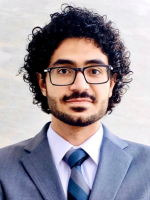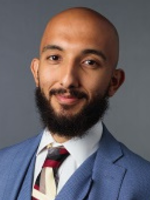
“It is always very important for us, as providers and as a health system, to make every effort to understand our patients’ spiritual and cultural values and strive to provide care that aligns with those values, while also bearing in mind the patients’ dignity,” said Hiba Zaidi, MBBS, an assistant professor of psychiatry and behavioral sciences.
This ideal of values-aligned treatment prompted resident psychiatrists Abdelrahman Ibrahim, MBBS, and Adam Howard, MD, ScM, and attending psychiatrist Zaidi to find ways Duke’s health system can better respond to the religious considerations of Muslim patients. They started with two projects—one focused on accommodating patients during the holy month of Ramadan, and the other on improving access to clothing appropriate for Muslim patients on psychiatric units.
About Ramadan & Eid al-Fitr

In 2025, Ramadan spans the month of March; observance dates shift by about 11 days each year depending on the Islamic “Hijri” calendar, which follows a lunar cycle.
“Ramadan is an incredibly special time for Muslims,” noted Ibrahim. During this time, Muslims commemorate the revelation of the Quran—the central religious text of Islam—and fast from food and drink from pre-dawn to sunset. They also spend extra time reading the Quran and performing special prayers; engage in charitable giving and service; and bond with their family, friends, and community.
“Ramadan is an incredibly special time for Muslims.”
— Abdelrahman Ibrahim, MBBS
Ramadan ends with the official Muslim holiday “Eid al-Fitr,” which translates to “the festival of the breaking of the fast.” This year, Eid al-Fitr is expected to fall on March 30, though the date may vary by a day depending on the sighting of the crescent moon, marking the start of a new Islamic lunar month. This holiday is a community-wide celebration with congregational prayers and family reunions.
Fasting & Clinical Guidance to Support this Practice

Fasting holds multifold significance for Muslims. “There’s a sense of self-disciplining,” said Zaidi. “Managing the urges for hunger and thirst helps develop patience and self-regulation.” She added that the experience of hunger also helps cultivate empathy and compassion for those who are less fortunate and food-deprived, thus encouraging acts of gratitude, kindness, generosity, and solidarity.
Fasting also has implications for taking medications, which must be thoughtfully timed and managed so as not to interfere with this religious practice. To help their colleagues support Muslim patients during Ramadan, Zaidi, Ibrahim, and Howard developed a set of brief, easy-to-follow guidelines.
For example, they advise timing medications for pre-dawn or post-sunset and scheduling inpatient blood draws after sunset when possible, as well as being careful when prescribing medications that can cause dehydration. They also share ways to help the inpatient nursing staff ensure their care aligns with Ramadan observance, such as noting in the communication order that the patient’s evening meal should be saved until after sunset.
Although the guidance was created for and distributed to Duke behavioral health care providers, much of the information applies across other specialty areas. Zaidi, Ibrahim, and Howard plan to advocate for incorporating the guidelines into Epic workflows.
As noted in the guidance document, spending time in a hospital during Ramadan can be extremely challenging and distressing. Communicating that we understand our patients’ needs not only shows compassion and improves the physician-patient relationship, it can also make a tangible impact in a patient’s journey to recovery.
See the full guidance document.
Spiritually-Informed Care throughout the Year
Zaidi, Ibrahim, and Howard are also pursuing broader steps to support Muslim patients at Duke. They’re exploring ways to provide access to safe long-sleeve garments and Islamic head coverings (hijabs).
Some hospitalized patients—such as those at risk of suicide—are required to wear paper outfits similar to medical scrubs to protect their safety. The paper easily tears, making it difficult to cause harm with these garments. However, the paper scrubs currently available don’t accommodate Muslim women who follow Islam’s hijab requirement, as they’re short-sleeved and don’t include head coverings. To address this misalignment, the team is working on stocking long-sleeved paper tops reminiscent of a coat as well as paper head coverings.
“These procedures are in place for patient safety, but at the same time, we also have to bear in mind cultural and spiritual sensitivities and look for different ways to navigate those, balancing our policies with culturally-informed care.”
— Hiba Zaidi, MBBS
“These procedures are in place for patient safety, but at the same time, we also have to bear in mind cultural and spiritual sensitivities and look for different ways to navigate those, balancing our policies with culturally-informed care,” said Zaidi.
They’re also devising strategies to help Muslim patients avoid medications made with byproducts of pork, which is forbidden for Muslims to consume. For example, they advise clinicians to ask Muslim patients if avoiding these medications is part of their spiritual practice. If so, with the patient’s permission, the clinician can note a pork allergy in their medical chart, and when possible, alternative medications can be prescribed.
Advice for Caring for Muslim Patients
Zaidi, Ibrahim, and Howard shared some additional advice to providers caring for Muslim patients.
Zaidi suggests approaching patient relationships with humility and curiosity, and encouraging patients who identify as religious or spiritual to lean into these practices, which can serve as a protective factor for mental and physical health. She noted that Harold Koenig, MD, a professor of psychiatry and behavioral sciences in the Duke University School of Medicine, has demonstrated the positive effects of spirituality on health outcomes through his extensive research.

Howard warns against assuming uniformity of values when caring for patients with different belief systems. For example, some Muslim patients may at times prioritize adhering to religious practices over receiving medically optimized treatment. He recommends having frank conversations with patients about what’s important to them in their health care and how different treatment options might align—or not—with their values.
Ibrahim also advises initiating conversations with Muslim patients about their religious practice; for example, providers can ask a simple question such as, “Are you taking your medicine any differently during Ramadan?”
Supporting Muslim Providers and Staff during Ramadan
Zaidi also offered some ways to support Muslim providers and staff as they balance professional and religious obligations during Ramadan. Breaks for prayers or Quran recitations, informal check-ins from colleagues, and a little extra grace in scheduling—for example, accommodating for breakfast at pre-dawn and dinner at sunset for those working overnight or late shifts—go a long way in creating an inclusive and culturally sensitive environment, she said.
Learn More
- Download the Ramadan guidance for physicians.
- Learn more about Ramadan by reading the second chapter of the Quran, listening to or reading this article, or checking out this brief summary.
- Reach out to Adam Howard, MD, ScM (adam.howard@duke.edu) or Hiba Zaidi, MBBS (hiba.zaidi@duke.edu) with questions about Islam or caring for Muslim patients.
- Duke resources for Muslims include, but are not limited to, the Duke Center for Muslim Life and Duke Health Chaplain Services.